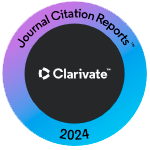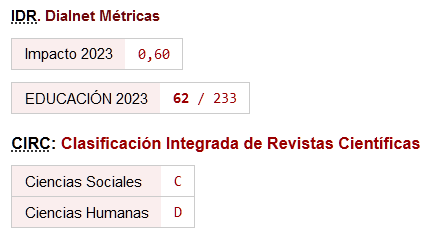Un análisis fenomenológico interpretativo de los desafíos a los que se enfrentan los profesores universitarios en Pakistán en medio del covid-19
DOI:
https://doi.org/10.46661/ijeri.5256Palabras clave:
Aprendizaje en línea, Covid-19, Desafíos, IPAResumen
Este estudio tenía como objetivo analizar los desafíos a los que se enfrentan los profesores universitarios durante la transición hacia clases puramente en línea debido al brote de Covid-19 en Pakistán. Se utilizó un diseño de investigación cualitativa empleando un enfoque de análisis fenomenológico interpretativo para capturar la experiencia de los profesores universitarios. Se realizaron entrevistas con los participantes seleccionados a través de la técnica de muestreo de bolas de nieve. Y los resultados mostraron que los profesores universitarios en Pakistán tenían que hacer frente a muchos desafíos. Los factores específicos como los problemas de infraestructura, las dificultades de comportamiento de los estudiantes y las dificultades en la evaluación del rendimiento de los estudiantes indican que las aulas físicas son un modo de aprendizaje más eficaz que el modo de aprendizaje en línea. Finalmente, este es uno de los primeros estudios para abordar los desafíos de aprendizaje en línea que enfrentan los profesores universitarios en Pakistán durante el brote de Covid-19.
Descargas
Citas
Abdullah, N. A., & Mirza, M. S. (2020). Evaluating Pre-Service Teaching Practice for Online and Distance Education Students in Pakistan: Evaluation of Teaching Practice. The International Review of Research in Open and Distributed Learning, 21(2), 81-97.
Akram, M., Anjum, F., & Batool, Z. (2020). Covid-19: A Reason behind Digital Education in Pakistan. Mediterranean Journal of Social Sciences, 11(4), 19. https://doi.org/10.36941/mjss-2020-0037
Anwar, M., Khan, A., & Sultan, K., (2020). The Barriers and Challenges Faced by Students in Online Education during Covid-19 Pandemic in Pakistan. GOMAL University Journal of Research, 36(1), 52-62.
Behera, S. K. (2013). E- and m-learning: A comparative study. International Journal on New Trends in Education and Their Implications, 4(3). 65-78.
Burgess, S., & Sievertsen, H. H. (2020). Schools, skills, and learning: The impact of COVID-19 on education. VoxEu. org, 1.
Choi, M., Cristol, D., & Gimbert, B. (2018). Teachers as digital citizens: The influence of individual backgrounds, internet use and psychological characteristics on teachers' levels of digital citizenship. Computers & Education, 121, 143-161.
Creswell, J. W., & Poth, C. N. (2016). Qualitative inquiry and research design: Choosing among five approaches. London: SAGE Publications Ltd.
Dean, S., Payne, S., & Smith, J. (2006). Low back pain: exploring the meaning of exercise management through interpretative phenomenological analysis. In: Finlay L, Ballinger C (eds). Qualitative Research for Allied Health Professionals: Challenging Choices, pp.139-55. Chichester: John Wiley and Sons Ltd.
Eatough, V. & Smith, J. A. (2008). Interpretative phenomenological analysis. In C. Willig, & W. Stainton-Rogers (Ed.). The Sage handbook of qualitative research in psychology, pp. 179-194. Los Angeles: Sage. https://doi.org/10.4135/9781848607927.n11
Gibbs, G.R. (2014). Using software in qualitative analysis. In U. FLick, W. Scott, & K. Metzler (Eds.). The SAGE Handbook of Qualitative Data Analysis, pp. 277- 294. London: SAGE Publications Ltd.
Gillett-Swan, J. (2017). The challenges of online learning: Supporting and engaging the isolated learner. Journal of Learning Design, 10(1), 20-30.
Hashmi, M. U., & Shuja, S. (2020). The Barriers and Challenges Faced by students in Online Education during Covid-19 Pandemic in Pakistan. Gomal University Journal of Research, 36(1), 30–39. Retrieved from: http://www.gujr.com.pk/index.php/GUJR/article/view/1115
Hislop, G. W., & Ellis, H. J. (2004). A study of faculty effort in online teaching. The Internet and higher education, 7(1), 15-31.
Hogan, R. L., & McKnight, M. A. (2007). Exploring burnout among university online instructors: An initial investigation. The Internet and Higher Education, 10(2), 117-124.
Krueger, R.A., (2014). Focus groups: A practical guide for applied research. London: SAGE Publications Ltd.
Li, C., and Irby, B. (2008). An overview of online education: Attractiveness, benefits, challenges, concerns, and recommendations. College Student Journal, 42, 449–458.
McQuiggan, C. A. (2007). The role of faculty development in online teaching’s potential to question teaching beliefs and assumptions. Online Journal of Distance Learning Administration, 10(3), 1-13.
Mezirow, J. (2000). Learning as Transformation: Critical Perspectives on a Theory in Progress. The Jossey-Bass Higher and Adult Education Series. Jossey-Bass Publishers, 350 Sansome Way, San Francisco, CA 94104.
Morris, L. V., & Finnegan, C. L. (2009). University System of Georgia's eCore: Virtual general education. New Directions for Higher Education, 146, 25-34.
Mukhtar, K., Javed, K., Arooj, M., & Sethi, A. (2020). Advantages, Limitations and Recommendations for online learning during COVID-19 pandemic era. Pakistan Journal of Medical Sciences, 36(COVID19-S4), 27-31. https://doi.org/10.12669/pjms.36.covid19-s4.2785
Oomen-Early, J., & Murphy, L. (2009). Self-actualization and e-learning: A qualitative investigation of university faculty's perceived barriers to effective online instruction. International Journal on E-Learning, 8(2), 223-240.
Orlando, J., & Attard, C. (2015). Digital natives come of age: The reality of today’s early career teachers using mobile devices to teach mathematics. Mathematics Education Research Journal, 28, 107–121. doi:10.1007/s13394-015-0159-6
Salifu, M., and Todd, R. (2020). Ghana's Teacher Education System and Responding to COVID-19. Retrieved from: https://www.ttel.org/news-view/ghanas-teacher-education-system-and-respondingto-covid-19
Smith, J. A., & Osborn, M. (2008). Interpretative phenomenological analysis, in J.A. Smith (Ed). Qualitative Psychology: A practical guide to research Methods (2nd edn). London: SAGE Publications Ltd.
Smith, J. A., Jarman, M., & Osborn, M. (1999). Doing interpretative phenomenological analysis. Qualitative health psychology: Theories and methods, 218-240.
Syverson, M. A., & Slatin, J. (2010). Evaluating learning in virtual environment. Retrieved from: http://www.learningrecord.org/caeti.htm
Descargas
Publicado
Cómo citar
Número
Sección
Licencia
Derechos de autor 2020 Fareyha Said, Iffat Ali, Tariq Javed

Esta obra está bajo una licencia internacional Creative Commons Atribución-NoComercial-SinDerivadas 4.0.












